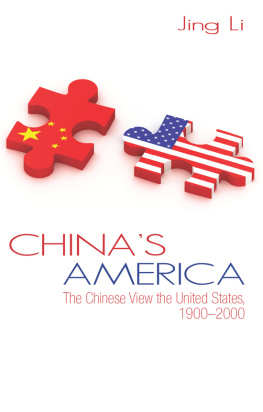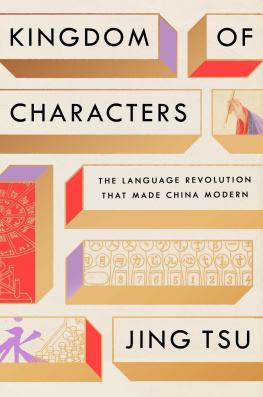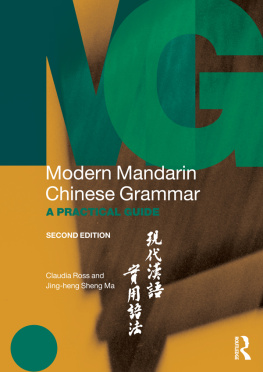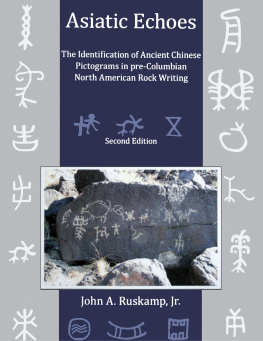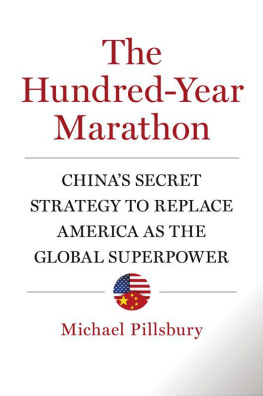Published by State University of New York Press, Albany
2011 State University of New York
All rights reserved
Printed in the United States of America
No part of this book may be used or reproduced in any manner whatsoever without written permission. No part of this book may be stored in a retrieval system or transmitted in any form or by any means including electronic, electrostatic, magnetic tape, mechanical, photocopying, recording, or otherwise without the prior permission in writing of the publisher.
For information, contact State University of New York Press, Albany, NY
www.sunypress.edu
Production by Eileen Meehan
Marketing by Fran Keneston
Library of Congress Cataloging-in-Publication Data
Li, Jing.
China's America : the Chinese view the United States, 19002000 / Jing Li.
p. cm. (SUNY series in Chinese philosophy and culture)
Includes bibliographical references and index.
ISBN 978-1-4384-3517-6 (hardcover : alk. paper)
1. United StatesForeign public opinion, ChineseHistory20th century. 2. Public opinionChinaHistory20th century. I. Title.
E183.8.C5L313 2011
327.7305109'04dc22 2010023368
10 9 8 7 6 5 4 3 2 1
Acknowledgments
Many people kindly helped me as I wrote this book. It is impossible to name them all or thank them enough. I would like to identify the following individuals and institutions and express my deep appreciation of their support.
I am tremendously grateful to Dr. Richard J. Smith at Rice University, who taught me, kindly befriended me, and provided guidance and encouragement over the years. I thank my other professors at Rice University, from whom I learned a great deal, and thank the university itself for its generous support. My gratitude also goes to Dr. Roger Ames of the University of Hawai'i at Manoa, who took notice of my study and encouraged me to turn it into a book. I greatly appreciate the support of Duquesne University, especially that of my colleagues in the History Department and McAnulty College of Liberal Arts. Dr. Jean Hunter, the former head of the history department, helped me in innumerous ways and read most chapters in my manuscript. I am also indebted to my former colleagues at St. Mary's College of Maryland, particularly those in the Division of History and Social Sciences and in the Asian studies program of the college, whose friendship and support I greatly appreciate.
In Beijing, at the Institute of Modern History, the Chinese Academy of Social Sciences, I learned a great deal from many scholars, among them Professors Ding Mingnan, Zhang Zhenkun, and Tao Wenzhao, who guided me when I first started my academic career there. In 200001, I returned to the Institute and spent one year there as a visiting scholar. I thank Professor Zhang Haipeng, Professor Wang Jianlang, and Ms. Sun Siyuan for making the visit possible. Also at the Institute, Professor Li Xuetong has been a good friend for many years and has helped me in research on various occasions.
I thank Professors Li Shiyue, Chen Guizong, and Zhao Shiyuan who advised me at Jilin University.
I did much of my research at the following establishments: the libraries of the Chinese Academy of Social Sciences; the National Library of China; the Harvard-Yenching Library; the Hoover Institution on War, Revolution and Peace; the East Asian Library and the Center for Chinese Studies Library at UC Berkeley; the U.S. National Archives; and the U.S. Library of Congress. I greatly appreciate the service and assistance provided by the staff at these institutions.
Many friends helped me in my early years in the United States, among them Kenneth De Ville, then a fellow graduate student. A grant from the Kalternborn Foundation partly funded my research in the initial stage.
For their assistance in turning my manuscript into a book, I express my heartfelt thanks to editors at the SUNY Press, especially Nancy Ellegate, Senior Acquisition Editor, who lent me much support as I worked on the project.
I alone am responsible for whatever errors and weaknesses remain in my work.
Finally, I want to thank all members of my family. To my parents I dedicate this study; I know they are very happy to see its publication.
Note on Romanization
The pinyin system of romanization is generally used in this book, with a few exceptions. Older romanizations of names and terms are used where these traditional transcriptions are more familiar to Western readersfor example, Chiang Kai-shek instead of Jiang Jieshi, or Sun Yat-sen instead of Sun Zhongshan. In these cases, at the first appearance of an older romanization, its new form is provided in parentheses.
Introduction
I
One day in March 1998, while meeting with a group of delegates to the Chinese National People's Congress, Jiang Zemin, general secretary of the Chinese Communist Party and president of the People's Republic of China, suddenly started talking about Hollywood movies. High-spirited and expansive, Jiang told his audience how he had enjoyed certain American films. Some Hollywood creations promote good morals and have considerable educational value, Jiang said. He continued:
A new movie will soon be shown in our country. It's called Titanic. This film does a good job of depicting tension between love and money, the gap between the rich and the poor, and how people behave in different ways facing adversity. In any event, we shouldn't simply assume that, in cultural exchanges, the capitalist world has nothing worthy to offer us.
Jiang went on to reminiscence how, back in the 1940s, he, a college student in Shanghai, took great pleasure in watching American movies. Among those he remembered fondlyGone with the Wind, Singin' in the Rain, and Waterloo Bridge. I recently suggested that our comrades in the Politburo all go see Titanic, he said. I don't mean to beautify capitalism, but I do believe that we should all be knowledgeable not only on our own country but on the rest of the world too so that we can enrich and improve ourselves. One thing is cleardo not just assume that we alone are capable of moral education.
These comments, coming from the head of the Chinese Communist Party, were remarkable. In a country where ideology reigned supreme and politics was full of symbolism and cultural nuances, government officialsespecially those in high positionswere extremely cautious about what they uttered in public. Tight-lipped, they would stay close to official scripts and spoke mostly in party jargon, especially on a sensitive subject such as the United States. Why would General Secretary Jiang go out of his way to comment so freely and so publicly on Hollywood and American culture? To understand this, we should consider the context for the incident, with particular regard to the interplay among the Chinese government's U.S. policies, Chinese intellectuals' views on America, and the popular sentiments in China at the time.
Jiang Zemin came to the helm of the Chinese Communist Party in late 1989, shortly after the Chinese government's violent suppression of a large-scale pro-democracy movement, a crackdown that resulted in the death of numerous protesters in Beijing, to the horror and outrage of the world. Jiang's tenure as China's top leader thus began rather inauspiciously. However, in the years that followed, dramatic changes took place in both China's domestic affairs and its foreign relations. After an initial period of uncertainty and hesitation, the Chinese Communist Party decided to continue the liberal economic reform of the preceding decade. China's economy once again boomed, bringing prosperity to a large number of Chinese people.



